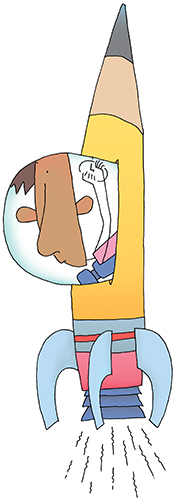We feel strongly that certain myths about writing must be dispelled to allow genuine learning to take place. This post identifies and counters eight of the most common myths about writing in middle school. In truth, the myths extend to writing in elementary school, high school, and beyond.
Myth 1: Students need a textbook.
Textbooks by their very nature are prescriptive. That is, they are designed so that a language arts curriculum is essentially built around them. As you know, textbook series are accompanied by volumes of supplementary materials that essentially tie teachers and students into the “system” more than they help students develop as independent thinkers and writers.
We believe that students must have a chance to develop their own ideas, to think and write for themselves. Teachers and students—with the aid of a few references (see below)—should help each other develop and refine their ideas in writing. This makes for meaningful learning.
Essential writing references: Internet access, a collection of writing models, a library of reading materials, and a writing handbook.
Myth 2: Students dislike writing.
Students don’t necessarily dislike writing; they just dislike writing about subjects that have little meaning to them. Students learn to enjoy writing when they develop their own ideas. This doesn’t mean that teachers should forgo assigning compositions. It simply means that writing assignments should have enough breadth and scope to allow students to select specific topics that interest them
In addition, students will learn to enjoy writing if they are encouraged to write freely about their own experience. Young learners love to write about themselves in journals, social posts, blogs, narratives, and personal essays. And of course, many students enjoy creative forms of writing—stories, plays, poems—as well.



